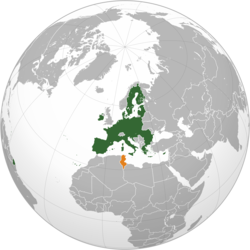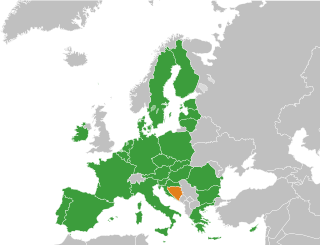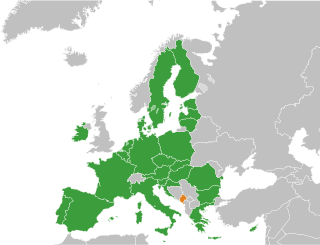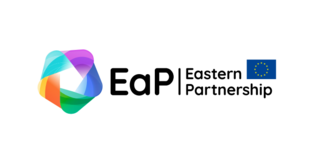 | |
European Union | Tunisia |
|---|---|
Tunisia–European Union relations are the foreign relations between the country of Tunisia and the European Union . [1]
 | |
European Union | Tunisia |
|---|---|
Tunisia–European Union relations are the foreign relations between the country of Tunisia and the European Union . [1]
The EU is Tunisia's largest trading partner. More than 75% of Tunisia's exports go to the EU and more than half of Tunisia's imports come from the EU. The total trade in goods between the EU and Tunisia in 2017 amounted to €20.5 billion. [2]
Tunisia receives some of the largest amount of money from the European Neighborhood Instrument out of all the participating countries with a "focus on different sectors such as the economy and the business environment; education, training and research; culture and media; migration and asylum; justice, freedom and security; environment, climate change and energy.". [3] In addition to funding for migrant relief, Tunisia benefits from several other EU funding projects such as the European Instrument for Democracy and Human Rights, Instrument contributing to Stability and Peace, and the Development Cooperation Instrument (DCI). [4] Tunisia is also a member of the Erasmus+ program and an associate member of Horizon 2020. [5] Flows of foreign direct investment to Tunisia are also concentrated on the development of the infrastructure network as well as of the textiles and clothing sectors. [6]
In July 2023, Tunisia and the European Union signed a memorandum of understanding to boost economic partnership and reduce immigration from Tunisia to Europe. [7] In September it was announced that as part of the agreement a payment of 127 million euros would be disbursed to Tunisia. [8] A month later however, Tunisia returned 60 million euros back to the EU due to disagreements over the deal. [9]
| Date | Event |
|---|---|
| 1976 | The European Economic Community formally starts working diplomatic relations with Tunisia. [10] |
| 1995 | An Association Agreement is signed between the EU and Tunisia. [11] |
| 14 July 1998 | The first meeting of the EU-Tunisia Association Council is held. [12] |
| 2012 | A Privileged Partnership is established following the aftermath of the Tunisian Revolution. [13] Since 2011, EU assistance to Tunisia has increased dramatically. |
| 3 March 2014 | The EU and Tunisia establish a Mobility Partnership in response to the migrant crisis, including "simplifying procedures for granting visas". [14] |
| 13 October 2015 | Negotiations for a Deep and Comprehensive Free Trade Area (DCFTA) between the EU and Tunisia begin. [15] |
| 29 September 2016 | The EU issues a Joint Communication Strengthening EU support for Tunisia. [16] |
| 1 December 2016 | The European Union and Tunisia launch the EU-Tunisia Youth Partnership. [17] |
| 16 July 2023 | The EU and Tunisia sign a Memorandum of Understanding on a strategic and global partnership. [7] |

The European Union (EU) has expanded a number of times throughout its history by way of the accession of new member states to the Union. To join the EU, a state needs to fulfil economic and political conditions called the Copenhagen criteria, which require a stable democratic government that respects the rule of law, and its corresponding freedoms and institutions. According to the Maastricht Treaty, each current member state and the European Parliament must agree to any enlargement. The process of enlargement is sometimes referred to as European integration. This term is also used to refer to the intensification of co-operation between EU member states as national governments allow for the gradual harmonisation of national laws.
The European Union has a number of relationships with foreign states. According to the European Union's official site, and a statement by Commissioner Günter Verheugen, the aim is to have a ring of countries, sharing EU's democratic ideals and joining them in further integration without necessarily becoming full member states.
A European Union Association Agreement or simply Association Agreement (AA) is a treaty between the European Union (EU), its Member States and a non-EU country that creates a framework for co-operation between them. Areas frequently covered by such agreements include the development of political, trade, social, cultural and security links.

Although there has been a large degree of integration between European Union member states, foreign relations is still a largely intergovernmental matter, with the 27 states controlling their own relations to a large degree. However, with the Union holding more weight as a single entity, there are at times attempts to speak with one voice, notably on trade and energy matters. The High Representative of the Union for Foreign Affairs and Security Policy personifies this role.

The European Neighbourhood Policy (ENP) is a foreign relations instrument of the European Union (EU) which seeks to tie those countries to the east and south of the European territory of the EU to the Union. These countries include some who seek to one day become either a member state of the European Union, or become more closely integrated with the European Union. The ENP does not apply to neighbours of the EU's outermost regions, specifically France's territories in South America, but only to those countries close to EU member states' territories in mainland Europe.

International relations between the European Union (EU) and Ukraine are shaped through the Ukraine–European Union Association Agreement and the Deep and Comprehensive Free Trade Area (DCFTA). Ukraine is a priority partner within the Eastern Partnership and the European Neighbourhood Policy (ENP). The EU and Ukraine have been seeking an increasingly close relationship, going beyond co-operation, to gradual economic integration and deepening of political co-operation. On 23 June 2022, the European Council granted Ukraine the status of a candidate for accession to the European Union.

The Commissioner for Neighbourhood and Enlargement is the member of the European Commission in charge of overseeing the accession process of prospective new member states and relations with those bordering the European Union (EU). The present Commissioner, as of December 2019, is Olivér Várhelyi.

The accession of Bosnia and Herzegovina to the European Union (EU) is the stated aim of the present relations between the two entities. Bosnia and Herzegovina has been recognised by the European Union as a "candidate country" for accession since the decision of the European Council in 2022 and is on the current agenda for future enlargement of the EU. Bosnia and Herzegovina takes part in the Stabilisation and Association Process and trade relations are regulated by an Interim Agreement.

Accession of Montenegro to the European Union is on the agenda for future enlargement of the EU.

Tonino Picula is a Croatian politician currently serving his third term as a Member of the European Parliament for Croatia, having successfully run in 2013, 2014, and 2019 European elections. He got involved in politics in the early 1990s and had served four consecutive terms as a member of the Croatian Parliament, having been elected in 2000, 2003, 2007, and 2011 parliamentary elections as a member of the center-left Social Democratic Party (SDP). He served as Minister of Foreign Affairs from 2000 to 2003 under prime minister Ivica Račan, and as mayor of Velika Gorica from 2005 to 2009.

The Republic of Azerbaijan and the European Union (EU) have maintained a positive relationship through the years and have become more closely linked since 1991. Azerbaijan is currently part of the European Neighborhood Policy, the Eastern Partnership and the Council of Europe. The EU is the largest foreign grant donor to and investor in Azerbaijan, both in the government sector and civil society, making available over 600 million EURO of bilateral EU assistance since 1992.

The Eastern Partnership (EaP) is a joint initiative of the European Union, together with its member states, and six Eastern European countries. The EaP framework governs the EU's relationship with the post-Soviet states of Armenia, Azerbaijan, Belarus, Georgia, Moldova, and Ukraine. The EaP is intended to provide a forum for discussions regarding trade, economic strategy, travel agreements, and other issues between the EU and its Eastern European neighbours. It also aims at building a common area of shared values of democracy, prosperity, stability, and increased cooperation. The project was initiated by Poland and a subsequent proposal was prepared in co-operation with Sweden. It was presented by the foreign ministers of Poland and Sweden at the EU's General Affairs and External Relations Council in Brussels on 26 May 2008. The Eastern Partnership was inaugurated by the EU in Prague, Czech Republic on 7 May 2009.

The Union for the Mediterranean is an intergovernmental organization of 43 member states from Europe and the Mediterranean Basin: the 27 EU member states and 16 Mediterranean partner countries from North Africa, Western Asia and Southern Europe. It was founded on 13 July 2008 at the Paris Summit for the Mediterranean, with an aim of reinforcing the Euro-Mediterranean Partnership (Euromed) that was set up in 1995 as the Barcelona Process. Its general secretariat is located in Barcelona, Catalonia, Spain.

European Union–Kazakhstan relations are the international relations between the Republic of Kazakhstan and the common foreign policy and trade relations of the European Union.

Relations between the European Union (EU) and the United Kingdom of Great Britain and Northern Ireland (UK) are governed, since 1 January 2021, by the EU–UK Trade and Cooperation Agreement (TCA).
The European Neighbourhood Instrument (ENI) came into force in 2014. It was the financial arm of the European Neighbourhood Policy, the EU's foreign policy towards its neighbours to the East and to the South. It had a number of programmes. In 2021, the ENI was merged into the new organization Global Europe.
The future enlargement of the Eurasian Economic Union is theoretically open to any of the post-Soviet states and potentially any country of Europe or Asia. In order to accede, a state must fulfill certain economic and political requirements. Enlargement of the Eurasian Economic Union is also subject to the consent of all existing members and the candidate's adoption of existing EEU laws and implementing previous decisions made by the Eurasian Economic Commission. The present agenda of the enlargement of the Eurasian Economic Union is primarily focused on Tajikistan. Meanwhile, Moldova was granted Observer Status in April 2017, followed by Uzbekistan and Cuba in December 2020. The process of enlargement is referred to as Eurasian integration or Eurasianism. This term is also used to refer to the intensification of economic cooperation between Eurasian Economic Union member states.

Relations between the European Union (EU) and Turkey were established in 1959, and the institutional framework was formalized with the 1963 Ankara Agreement. Albeit not officially part of the European Union, Turkey is one of the EU's main partners and both are members of the European Union–Turkey Customs Union. Turkey borders two EU member states: Bulgaria and Greece.

Poland has been a member state of the European Union since 1 May 2004, with the Treaty of Accession 2003 signed on 16 April 2003 in Athens as the legal basis for Poland's accession to the EU. The actual process of integrating Poland into the EU began with Poland's application for membership in Athens on 8 April 1994, and then the confirmation of the application by all member states in Essen from 9–10 December 1994. Poland's integration into the European Union is a dynamic and continuously ongoing process.

Algeria–European Union relations are the foreign relations between the country of Algeria and the European Union.